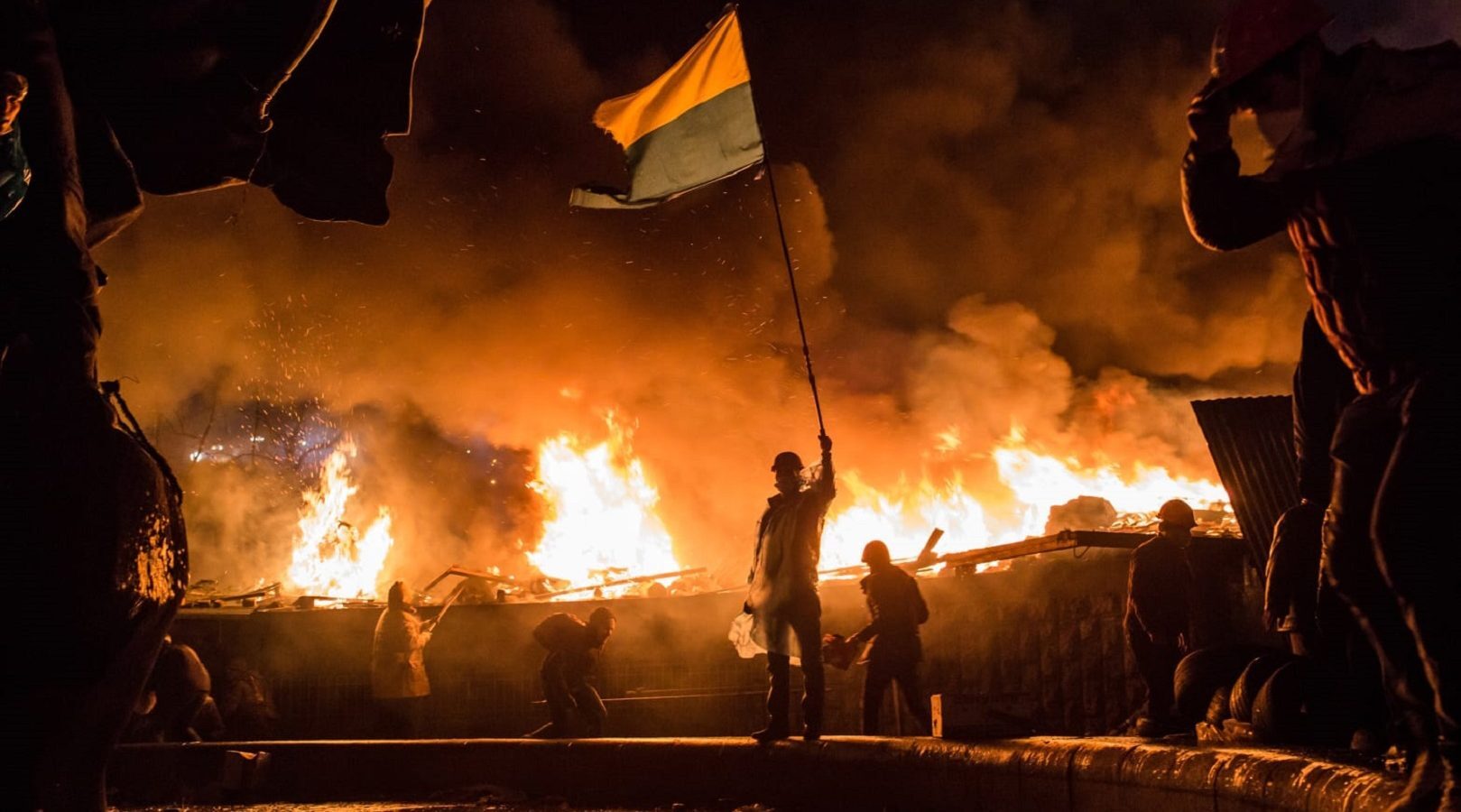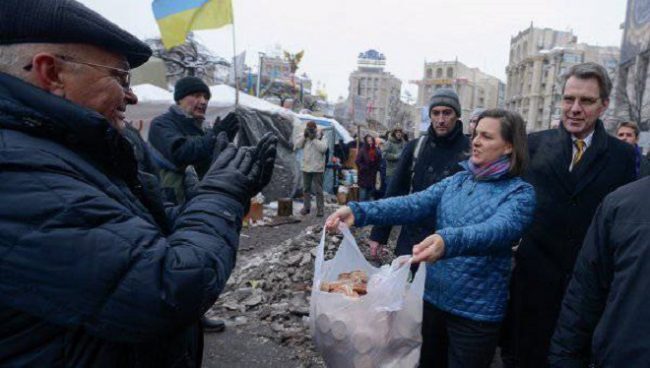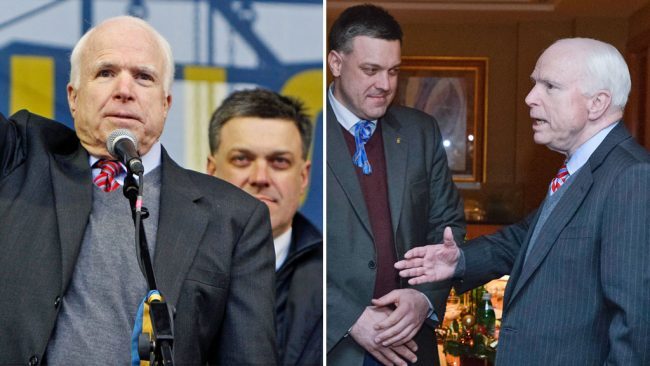De historiske, politiske og etniske opdelinger i Ukraine går årtier tilbage, hvis ikke århundreder, men vi har ikke plads til den slags dyb dyk. Indtil videre vil vi holde det til tre enkle dele: Viktor Janukovitjs fald, folkeafstemningen på Krim og den efterfølgende borgerkrig, som sætter regionen i en direkte vej til dagens begivenheder.
Ligesom vores 30 fakta om Covid, er dette stykke tænkt som en hurtig referencevejledning til at hjælpe med at få venner og familie opdateret på Ukraines nyere historie, et praktisk indeks over nutidige kilder eller et genopfriskningskursus for dem, der har glemt detaljerne.
Anyway, lad os komme til det.
1990
Following the fall of the Berlin Wall and the reunification of Germany, multiple Western leaders give both written and spoken assurances to then-Soviet leader Mikhail Gorbachev, that NATO does not plan to increase its territory eastwards.
To quote US Secretary of State James Baker:
not only for the Soviet Union but for other European countries as well it is important to have guarantees that if the United States keeps its presence in Germany within the framework of NATO, not an inch of NATO's present military jurisdiction will spread in an eastern direction."1997
The Charter on a Distinctive Partnership is signed by representatives of both NATO and Ukraine. This document is a long-term agreement that Ukraine will move gradually into cooperation with NATO and eventually become a member. This is in direct violation of the assurances given above.
2002
NATO publishes their NATO-Ukraine Action Plan, re-affirming their commitment to "closer ties" with Ukraine, and outlining a long term plan for "reforms" in Ukraine that will make it suitable for "full Euro-Atlantic integration".
2008
US Secretary of State Condoleeza Rice and Ukrainian Foreign Minister Volodymyr Ohryzko sign the US-Ukraine Charter on Strategic Partnership,the charter "emphasizes the continued commitment of the United States to support enhanced engagement between NATO and Ukraine".
FEBRUARY
Viktor Yanukovych, leader of Ukraine's Party of Regions, wins the presidential election and is named Ukraine's fourth President. Yanukovych is the former governor of Donetsk, the region of his birth, and wins office with a huge percentage of the vote from ethnically Russian east Ukraine.
MAY
As one of his first acts as President, Yanukovych signs an agreement with Russia, extending their lease on the Black Sea naval base in Crimea until at least 2042. This extension is met with consternation and rebuke in the Western press, with one paper asking:
The End of Ukraine's EU Integration?"Writing in the Guardian, Luke Harding called it:
the most concrete sign yet that Ukraine is now back under Russia's influence following Yanukovych's victory in February's presidential elections.Also noting that "the lease extension is likely to increase opposition to Yanukovych in Ukraine's western provinces"
A PEW poll finds the majority of Ukrainians opposed to joining NATO.
JUNE
Ukraine's parliament votes through a new bill barring the country from joining any military bloc. This, as the BBC noted at the time, effectively ends any prospect of Ukraine joining NATO, killing a plan that the West had worked on for 13 years.
2012
Yanukovych's Party of the Regions secures victory in the parliamentary elections, increasing its number of seats and seeing its biggest rival, Arseniy Yatsenyuk's Batkivshchyna (Fatherland) party lose 55 seats.
However, the elections also mark the first time Ukraine elected a far-right MP to its parliament, with Oleh Tyahnybok's Svoboda party winning 37 seats and over 10% of the vote (entirely from the ethnically Ukrainian west of the country).
Contemporary press reports, as well as think-tanks such as OpenDemocracy, note the "concerning" rise of "far-right politics" in Ukraine.
SEPTEMBER
The Ukrainian cabinet unanimously approves the draft of the long-awaited Ukraine-EU Association Agreement. Yanokuych is expected to officially sign the agreement at the EU's "Eastern Partnership Summit" in Vilnius on November 28th and 29th.
Russia - Ukraine's major creditor and biggest trade partner - warns that this treaty would "cause chaos", break the terms of an existing treaty between Ukraine and Russia, and lead to Ukraine's economy collapsing. As a counteroffer, they suggest Ukraine sign a new deal with the Eurasian Economic Union.
NOVEMBER
The Ukrainian government issues a decree suspending preparations for the association agreement (AA). Deputy Prime Minister Yuriy Boyko warns the current terms of the agreement would "seriously damage the economy".
"Pro European" demonstrations begin in Maidan square within days of the decree being issued. A poll run by the Kyiv Post finds an even split on joining the EU vs the Eurasian customs union: 39% for, 37% against.
Yanukovych attends the Eastern Partnership Summit on the 28th, but does not sign the Association Agreement, instead suggesting a new tri-lateral agreement between Ukraine, Russia and the EU. Russia is open to negotiating such a deal, but EU rejects this offer completely.
Despite not signing the AA, Yanukovych tells the press that Ukraine still intends to work for closer ties with the EU: "an alternative for reforms in Ukraine and an alternative for European integration do not exist...We are walking along this path and are not changing direction".
Prime Minister Mykola Azarov echoed this: "I affirm with full authority that the negotiating process over the Association Agreement is continuing, and the work on moving our country closer to European standards is not stopping for a single day".
Nevertheless, this is ubiquitously covered in the Western media as Yanukoych "refusing to sign the association agreement in favour of closer ties with Russia".
Thousands more gather in Maidan Square and others begin occupying Kiev City Hall. Protests intensify as opposition politicians speak of Yanukovych "committing treason", they call for a re-run of the Presidential election, despite new elections being only 18 months away.
On November 29th the protesters make their first "official" demands, including the immediate resignation of Viktor Yanukovych.
DECEMBER
1/12/2013 - Thousands of protesters chanting "revolution" storm the metal barriers erected by riot police. Protesters throw Molotov cocktails:2014
The police withdraw from the square. Over 200 people are injured, including over 100 police officers.
2/12/2013 - Protesters erect barricades around the Maidan, block access to government buildings and attempt to storm the Presidential administration. Even the Guardian notes that the police withdrew.
In a press conference, far-right MP Oleh Tyanybohk officially calls it a "revolution", and asks that police and members of the military defect to their side.
3/12/2013 - Writing in the New Republic, Julia Ioffe praises the Maidan protesters, citing specifically the throwing of Molotovs at police:When the police came, unlike the Muscovites, they didn't leave. They swung chains and threw Molotov cocktails and built barricades in the streets. They took over municipal buildings. They nearly toppled the city's main statue of Lenin. They sang the national anthem and chanted "Revolution!"8/12/2013 - Protesters topple a statue of Lenin. Grafitti reading "Yanukovych you're next" is scrawled on walls. An effigy of Gadaffi's severed head is carried around the square to chants of "Yanukovych the game is over!". Kyiv Post reports preparation of Molotov cocktails.
10/12/2013 - Berkut riot police attempt to break down the barricades and clear the square. Tear gas is deployed. They are beaten back.
11/12/2013 - US Deputy Secretary of State Victoria Nuland and US Ambassador Geoffrey Pyatt visit the protests and talk to opposition leaders. They are photographed shaking hands and distributing food:
That same day Foreign Affairs, the official publication of the Council on Foreign Relations, runs an article headlined: "Yanukovych Must Go"
Also that same day, former President Leonid Kravchuk hosts a "roundtable" political discussion with members of all parties and all of Ukraine's past presidents, the aim is to diffuse the crisis. The talks have Yanukovych's blessing, the opposition refuses to attend.
13/12/2013 - US Senator John McCain visits Kiev where he gives a speech telling the crowd "We are here to support your just cause".
Later he is photographed shaking hands with Oleh Tyahnybok, leader of the far-right Svoboda party:
The UK's Channel 4 news reported [emphasis added]: "Far-right group at heart of Ukraine protests meet US senator".
JANUARY
14/1/2014 - Protest activity resurges after a lull over the Christmas/New Year period.FEBRUARY
15/1/2014 - At a meeting of the US Senate's Foreign Affairs Committee, Deputy Assistant Secretary of State Thomas Melia admits that the US State Department has spent 5 billion dollars "assisting Ukraine".
This includes 180 million dollars on "development programs" for "judges, members of parliament [and] political parties".
16/1/2014 - After weeks of stalemate, the Ukrainian parliament passes ten new bills into law. Known collectively as the "Anti Protest Laws", these laws allow a strict crackdown on protest activity, including removal of parliamentary immunity from MPs promoting violence and stripping of drivers license from those that used vehicles to obstruct public roads.
19/1/2014 - Clashes between riot police and protesters on Hrushevskoho Street, many of the protesters are from far-right groups such as Svoboda and Right Sector, and are seen wearing neo-nazi symbols and slogans.
25/1/2014 - President Yanukovych reaches out to opposition leaders, offering them a power-sharing agreement that would install Yatseniyuk as Prime Minister and Vitaliy Klitschko as his deputy. The opposition refuses the offer.
28/1/2014 - In a gesture of compromise, the parliament repeals 9 of the ten protest laws, passing a new law granting amnesty to all those involved in the protests, providing they cease occupying government buildings. The oppostion refuses these terms.
7/2/2014 - A recorded phone call between Nuland and Pyatt is leaked to the press, famously dubbed the "fuck the EU" call.MARCH
In the conversation, dated January 28th, Nuland and Pyatt discuss at length the structure of the Ukrainian cabinet once Yanukovych is gone. This is still 25 days before Yanukovych was removed from power
A poll published that same day by the Kyiv Post found more Ukrainians opposed the Maidan protests than supported them.
16/2/2014 - In yet another attempt at compromise, the government releases all prisoners arrested during the protests, this time the opposition responds, lifting their 3-month long occupation of Kiev City Hall.
19/2/2014 - President Yanukovych declares a "truce" in a joint statement signed by the three main opposition leaders. The statement committed to negotiation for a lasting peace.
20/2/2014 - Snipers open fire on the crowd in Maidan Square, resulting in at least sixty deaths. Both protesters and police officers are killed in the gunfire. EuroNews reports that the "truce is shattered" mere hours after it was signed.
21/2/2014 - Despite the bloodshed, negotiations continue, resulting in the "Agreement on settlement of political crisis in Ukraine", signed by all parties plus the foreign minsiters of Germany and Poland.
The agreement required the creation of a temporary "National Unity Government", to be replaced following new Presidential Elections by the end of 2014. It also called for a full investigation into the shootings on the Maidan the previous day.
Yanukovych pledged that the government would not declare a state of emergency or call in the military, and would pull all police back from the site of the protests, in return for protesters surrendering all public buildings and illegal weapons.
Leaders of the militant protesters - including Dmitryo Yarosh of the neo-Nazi Right Sector - rejected the agreement, and threatened to storm the Parliament and Presidental Residence if Yanukoyvch did not resign immediately.
22/2/2014 - Rather than abiding by the terms of the agreement, once the police pulled back the protesters stormed government buildings and seized control of Kiev. Yanukovych flees to the city of Kharkiv in eastern Ukraine.
A contemporary Time article reported:Ukraine's beleaguered President Viktor Yanukovych fled Kiev Saturday as protestors took full control of Ukraine's capital, signaling a dramatic turn in the three-month crisis just hours after the signing of an European Union-sponsored peace deal [...] As police abandoned their posts across the capital, the opposition established control over key intersections and captured the presidential palace, setting up a perimeter around Yanukovych's former residenceWithin hours of the storming of the city, the Ukrainian parliament votes to strip Yanukovych of his office by 328 votes to 0, with over 120 MPs absent from the vote. This vote was unconstitional and not a legally binding form of impeachment, in any way.
From the eastern city of Kharkiv, Yanukovych gives a televised speech, declaring he was still the "legitimate elected President of Ukraine", and that he had no intention of fleeing the country.
24/2/2014 - Parliament removes 1/3 of Ukraines Constitutional Court from office, issues an arrest warrant for President Yanukovych.
25/2/2014 - Yanukovych's own Party of the Regions disavows him in parliament, and he flies to Russia, claiming his life is in danger.
27/2/2014 - Arseniy Yatsenyuk is sworn in as Ukraine's interim Prime Minister, a post he would hold onto following elections in May 2014.
Vitaly Klitschko is relegated to the somewhat lower office of Mayor of Kiev, and Oleh Tyahnybok resumed his office as a simple MP.
Ukraine's new government takes shape exactly as predicted by Nuland in her phone call of January 28th.
The same day Anders Fogh Rasmussen, Secretary General of NATO, tells the press that "the door is still open" for Ukraine to join the military bloc.
28/2/2014 - UK current events show Newsnight runs this segment, titled "The Neo-Nazi Threat in New Ukraine":
Evidence emerges that the snipers shooting at the crowds were not employed by the Ukrainian government, but were shooting at both sides in an effort to stoke chaos.
This evidence is presented to the EU's Foreign Policy Chief Catherine Ashton by Estonia Foreign Minister Urmas Paet in a phone call that is later leaked to the press, and confirmed to be genuine by the Estonian government.
Neither the EU, nor the new government of Ukraine, makes any effort to investigate this evidence or bring the killers to justice.
On the 21st of March the interim government of Ukraine officialy signs the controversial European Union Association Agreement into law.
OCTOBER
Following the 2014 parliamentary elections, the 5-party coalition government officially makes joining NATO a "national priority".
* * *
So, there it is, a timeline of the key events leading to the fall of Viktor Yanukovych. Genuine grassroots revolution, or NATO backed coup? You decide. We'll catalogue Ukraine's further collapse into chaos and civil war in parts two and three of this timeline, coming soon.






Kommentar: See also: Russia Launches Massive Military Operation in Ukraine - Reports of Multiple Explosions, Attacks on Military Targets From Donbass to Kiev